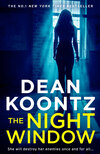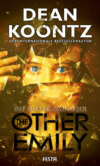Kitabı oku: «The Night Window», sayfa 4
13
In Garret Nolan’s garage, Jane straddled the motorcycle, flexed her hands around the grips, looking it over—speedometer/tachometer, clutch lever, brake lever, throttle—getting the feel of the machine before putting up the kickstand.
Nolan said, “One more thing you should know. They say Jane Hawk avoids bus stations, train stations, and airports because facial-recognition programs scan travelers for known terrorists and wanted criminals. But that’s not good enough anymore.”
Jane was curious, but Leslie Anderson was on the run only from her former boss, not from the feds, so neither of them expressed interest in what Nolan had said.
“About a year ago,” he continued, “the Chinese government began deploying among their police departments these freaky damn eyeglass-mounted cameras equipped with face-rec tech. Now some of my buddies still in U.S. spec ops recently received the same gear.”
Six months earlier, Jane would have taken such a claim with the entire contents of a salt shaker. Fixed-camera recognition systems were connected to remote facial databases stored in the cloud, so vast they—along with artificial-intelligence analytics—couldn’t be loaded onto the front end of a wearable camera. But technology was advancing at a remarkable pace, especially the tech that could be used for population control and oppression.
“These sunglasses are wired to a handheld device with an offline facial database of up to ten thousand faces,” Nolan said. “The AI is good enough to match a suspect’s face to one in the d-base in just six hundred milliseconds. Fixed cameras have limited lines of sight, but someone wearing these can look everywhere.”
She couldn’t restrain herself from saying, “That sucks.”
Nolan said, “If this gear is being issued to some in the military, you can bet your ass security agencies on the domestic side also have them. So maybe if you ever happen to run into Jane Hawk someday, tell her the one face currently sure to be in that portable d-base is hers. Nowhere is safe.”
“Has anywhere ever been?”
From the seat of a nearby Harley, he picked up a pearl-white Shoei X-9 Air helmet with a dark-smoke shield. “Too bad you can’t wear this everywhere.”
Accepting the helmet, Jane said, “What if they nail me and trace this bike back to you?”
“They can’t.”
“Why not?”
“Ever since I left the military, I’ve been doing business in ways that move me step by step toward the edge of the grid.”
“Gonna go all the way off?”
“Sooner than later, we’ll sell the house and head so far up-country you’d think it was the nineteenth century.”
“Sorry to hear that,” she said. “The more people like you and your wife who get out of the game, the more likely the bastards will win in the end.”
He shrugged. “We’ve got one life, and we don’t want to live any part of it on our knees, which is likely if we stay here.”
14
The two rayshaws walked Tom to the front of the VelociRaptor and about another forty feet through the vehicle’s lances of light before halting. One of them gave him the unloaded pistol. The other put a plastic sack with a drawstring closure on the ground at his feet.
They returned to the truck and boarded it. The vehicle hung a U-turn and drove away, taillights tinting the snow with a suggestion of blood as it dwindled into the white cascades.
Although Tom stood shaking, he was warm enough in his storm suit.
He stooped to open the bag with the drawstrings. It contained the promised PowerBars and a knitted ski mask that he could wear under the storm-suit hood, with holes only for his eyes and mouth. There were also the promised tactical flashlight, the magazine for the Glock, and ten bullets.
He inserted the ammunition into the magazine, the magazine into the pistol, the pistol into a zippered pocket on the thigh of the storm suit’s right leg. He distributed the knitwear and six PowerBars in other pockets.
Maybe the drawstring bag would come in handy. He’d keep it and, until nightfall, carry the flashlight in it.
As he closed the bag, the Bell and Howell Tac Light clinked against something he hadn’t noticed. He fished inside and came up with a microcassette recorder.
When Tom pressed PLAY, Wainwright Hollister spoke to him. “You will die in this lonely place, Tom Buckle. If you’d been injected, adjusted, and sent back to California, at least you’d have had the pleasure of a fleeting orgasm when you raped ten-year-old Kaylee at my command. But although there will be no pleasure for you in the hours ahead, you’ll be blamed for Kaylee’s kidnapping a few days from now, because when her body is found in your home, it will bear your semen and your blood, which we will harvest from you after your death. The world will know you as a monster, Tom, and everyone will despise your films. You will be sought by police but, of course, never found. Who can say how many rapes and murders of other little girls will be attributed to Tom Buckle, the phantom pedophile, in years to come? Please don’t use the nine-millimeter Glock to kill yourself. I’m so looking forward to the hunt and the moment when I remove the threat to a stable future posed by your dangerous ideas and undeniable talent. Get moving, Tom. You have only a two-hour lead.”
Whether the recording was intended to be a psychological weapon that would unnerve Tom and make him easier prey or signified nothing more than the billionaire’s narcissism and cruelty, Hollister had provided his quarry with precious evidence of the murder that he intended to commit and of the Arcadian conspiracy in which he was a key player. Instead of depressing or unnerving Tom, the recording brought the light of hope into his heart and warmed him with the realization that Hollister wasn’t as prudent or smart as he had seemed in the context of his magnificent house and the company of his zombie guards.
He rewound the message and pressed PLAY again, intending to listen only to the threat of the first sentence, so that it might inspire him to escape or put up a hell of a fight if confrontation proved unavoidable. The recorder hissed slightly louder than the descending flakes that softly sheered the air, hissed and hissed, but the words it had conveyed had been erased, evidently even as they had first issued from the speaker.
The meadows were clotted with old snow and silvered with fresh, but he felt as if he stood on a burnt plain, in a world scourged by an apocalyptic fire, the pine woods in the distance as black as columns of char, the current storm an ashfall, the incinerated sky in slow collapse, the unseen sun not merely in decline but dying in the wake of a nova flare.
He could almost believe he was asleep, all this a dreamscape of a world in the wake of judgment. The insanity of the Arcadian scheme and the suddenness with which he’d been plunged into mortal peril merely because his talent put him on a list of undesirables seemed too fantastic to be other than a nightmare that would dissolve when he thrust up from his pillow and threw back the covers and switched on a bedside lamp.
Although he’d never known such cold as this, the day abruptly grew colder when the early stillness of the storm was swept away by a sudden wind out of the northwest. The snowflakes that had kissed his face now nipped. Wind stung his eyes, and tears blurred his vision.
15
Because she was riding a bike much different from the one on which she had sped away with Garret Nolan, Jane risked cruising to the motel, a one-star enterprise trying to pass for a two, where she had left her luggage the previous night.
Her locked suitcases contained nothing irreplaceable. However, because of the urgency of the investigation she’d undertaken and the ever-growing intensity of the search for her, she didn’t have time to go clothes shopping or visit the source in Reseda from whom she obtained guns, driver’s licenses in multiple identities, license plates, color-changing contact lenses, wigs, and other items that were essential to the chameleon changes that kept her free and alive.
They had apparently tied the Ford Explorer Sport to her; but that didn’t mean they knew where her lodgings were. In fact, if they knew, they wouldn’t have come after her in the library, but would have been lying in wait in the motel room when she returned.
If she could safely retrieve her bags, so much the better.
The entire San Fernando Valley had once been a thriving part of the California dream; but some communities were now in decline. The almost third-world shabbiness of this neighborhood belied the Golden State’s image of high style and glamour that was barely sustained by the grace and beauty of the better coastal towns. Potholed streets, littered and unkempt parks, used hypodermic needles glittering in the gutters, graffiti, public urination, and homeless people camped in the doorways of vacant buildings were testament to corrupt and incompetent governance.
The Counting Sheep Motel was a mom-and-pop operation, cracked white stucco with blue trim, sixteen units on two levels encircling a courtyard with a swimming pool. The pool was small, its coping fissured and stained; a mermaid and her adoring entourage of cartoon fish were painted on the bottom, shimmering under water that seemed not quite as clear as it ought to be.
Jane’s room—number three—was on the ground floor, at the front of the building. There was no sign of unusual activity.
She rode to the end of the block, turned right, curbed the Big Dog, and fed coins to the parking meter.
After taking the tote from one of the saddlebags, she walked back to a bar and grill called Lucky O’Hara’s, across the street from the motel. She took her helmet off only as she reached the entrance. In addition to the name of the establishment, the sign above the door featured a pot of gold and a leprechaun.
Assuming Lucky O’Hara had earlier enjoyed a lunchtime rush, now at three thirty-five the crowd had gone. Two retirees sat at the horseshoe bar, each alone, one of them in low conversation with the bartender. A young couple engaged in an intense discussion in one of the booths that lined both side walls. The tables at the front of the room were not occupied. Jane sat at a window table for two, with a clear view of the motel that stood across the street and somewhat west of her position.
If the owner and staff and primary clientele of Lucky O’Hara’s had once been Irish Americans, that seemed no longer the case. The waitress who took Jane’s order—two hamburger steaks, one atop the other, hold the hash brown potatoes, add extra vegetables, a side of pepper slaw, a bottle of Corona—was a pretty blond-haired black-eyed girl with a Bosnian accent.
The pilsner glass was frosted, the Corona ice cold. Properly chilled beer was one of the humble pleasures that kept her in a positive frame of mind during this ordeal of threat and violence. A hot shower, a piece of favorite music, the fragrance of a flowering jasmine vine growing on a trellis, and countless other little graces reminded her of how sweet life had once been and could be again. As motivation, a desire to live well and freely again was second only to her fierce determination to keep her child safe and to give him a future from which those who would enslave him had been eradicated.
She watched the motel during lunch. Red curb restricted parking to the farther side of the street. There were no paneled vans that suggested surveillance. No obvious sentry slouched in any of the cars or SUVs.
A few doors south of the motel, overdressed for the mild day in layers of ragged sweaters and a black-and-green tartan scarf, masses of hair and beard bristling as if fossilized in that configuration following an electric shock, a vagrant sat on the sidewalk, his back against the wall of a vacant storefront. Beside him stood a shopping cart in which were heaped large green trash bags bulging with whatever eccentric collection constituted his treasure.
Such a disguise was within the repertoire of a true stakeout artist. The vagrant was the sole subject of Jane’s suspicion—until he got to his feet, stepped to the recessed entry of the building, dropped his trousers, and defecated. Although a federal agent on such an assignment would take pride in the exactitude of the details of his costume and behavior, he would not feel obliged to take a dump in public for the sake of authenticity.
Glittering in the sunlight, traffic passed in riotous variety. Jane could not detect any vehicles repeatedly circling the block in a rolling surveillance of the motel.
The appearance of normalcy at Counting Sheep concerned her. When nothing whatsoever in a scene looked suspicious, when it seemed picture-postcard serene and downright churchy, it was at such high contrast with everyplace else in this fallen world that you had to wonder if it was a setup. She had developed measured paranoia as a survival trait not just since going on the run, but from her years in law enforcement.
She spooned ice from her water tumbler into the pilsner glass to chill the remaining beer, finished lunch, eyed her watch—4:33—ordered another Corona in a chilled glass, and asked for the check.
She paid and tipped 30 percent as soon as the beer arrived, so that when she took another hour, the waitress wouldn’t worry that maybe she would skip out on the check. She said, “The bastard was supposed to be here when I arrived. I’ll give him another hour to hang himself.”
Whether she had acquired her cynicism in Bosnia or California, the waitress bluntly said, “Dump him.”
“I keep saying I will, but I don’t.”
“Girl like you has options.”
“So far none better than him.”
“They play too much video game.”
“Who does?” Jane asked.
“This generation men. Video game, porn, Internet—they don’t know how to be real anymore.”
“Prince Charming is dead,” Jane agreed.
“Not dead. Just lost. We need to find. You can’t find when you won’t look.”
“Maybe you’re right. Do you keep looking for him?”
“I look, I hope, I date—but always with knife in purse.”
“Really? A knife in your purse?”
The waitress shrugged. “Is L.A. A girl can’t take chances these days.”
Jane nursed the second beer through another hour, watching the motel while pretending to be waiting for Mr. Wrong. The homeless man with the shopping cart moved on to defecate elsewhere. The elastic shadows stretched eastward. The traffic quarreled in greater volume through the street, as if there were no other avenue in all the world, every traveler bound frantically for the same and perhaps terrible place. Counting Sheep continued to represent itself as innocent and safe.
Excessive hesitation was the mother of failure. Winning required considered action. Get off the X. Move.
She returned to the motorcycle parked on the side street. She cruised around the block, pulled into the motel lot, and parked in front of Room 5, two doors north of the unit in which she’d left her luggage.
No one was currently in the immediate vicinity. If she was a figure of interest to someone, he might be watching her from behind a window, through parted draperies.
She took off her helmet, left it on the seat of the Big Dog, and went boldly to Room 3.
High situational awareness. In Condition Yellow. No eyes in the back of her head, but alert for any sound that didn’t belong in the basketweave of street noise.
She keyed the door and pushed, and it swung into a coolness of shadows, revealing the furniture as colorless shapes in the gloom.
Before crossing the threshold, she slid her right hand under her sport coat, to the grip of the pistol in her shoulder rig.
Warily, she glanced back at the parking lot, at the street, at the motel office to the south. Nothing.
A single-file succession of fat crows, eerily silent for their raucous kind, passed low overhead. Crisply defined shadows, blacker against the pavement than the birds were black against the sky, glided past her feet, as if to encourage her to flee with them.
She was not Jane Hawk. She was Leslie Anderson. If her pursuers knew about the Anderson ID and this motel, they would have come for her in this place rather than at the library. Somehow they knew about the car, but only the car.
She entered, closed the door, switched on lights. A housekeeper had been here. The bed was made. The fragrance of an orange-scented aerosol freshened the room, though under it lay the faint lingering staleness of marijuana smoke from some previous guest. The door to the small bathroom stood open wide, and a frosted window admitted enough light to reveal that no one waited in there.
All seemed the same as when she had checked in the previous afternoon. Nonetheless, she sensed a wrongness in the room that she could not define.
Two sliding mirrored doors served the closet. As she approached them, she looked not at her image, but at the reflection of the room behind her, which seemed somehow strange and not an exact likeness, as if a threat thus far invisible might materialize from some dark dimension suddenly folding into this one.
Engine noise swelled as a vehicle pulled off the street and into the motel lot. She focused on the room door reflected in the mirror before her. The engine died. A car door slammed. She waited. Nothing.
Sometimes in the deep of night, when the sleeper’s fantasy is benign—a golden meadow, an enchanting forest—anxiety arises with no apparent cause, just before the dream is invaded by men without faces, whose fingers are razor-sharp knives. Her disquiet now was akin to the dreamer’s apprehension, the cause intuited rather than perceived.
As she slid the left-hand closet door to the right, it stuttered slightly in its corroded tracks. Her two suitcases were gone. She pushed both doors to the left. The other half of the closet also proved to be empty.
She drew the Heckler & Koch Compact .45 and turned to the room, which had taken unto itself the strangeness that she had previously perceived only in the mirror, so that every mundane object seemed to have an alien aspect, malevolent purpose.
The bathroom window was too small to serve as an exit. The room door offered the only way out.
Draperies with blackout linings covered the window to the left of the door. She would gain nothing by parting those greasy panels of fabric to see what awaited her outside. Whatever it might be, she had no choice other than to go to it.
Pistol in hand but held under her sport coat, she opened the door. After the lamplit room, the sun-shot world made her squint. She stepped outside.
The Big Dog Bulldog Bagger had disappeared. To her left, in front of Room 1, under an ill-kept phoenix palm, stood the metallic-gray Ford Explorer Sport that she had abandoned at the library several towns from here.
Neither of the exits from the motel parking lot was blockaded. No cops. No plainclothes agents.
All seemed counterfeit, as if the street were only a movie set on a studio backlot.
In the new world aborning, reality seemed frequently displaced by virtual reality.
Most people were so enchanted by high technology, they didn’t see its potential for oppression, but Jane was aware of the darkness at the core of the machine. The current culture deviated radically from previous human experience, ruthlessly reducing each woman and man to mere political units to be manipulated, balkanizing them into communities according to their likes and dislikes, so everything from cars to candy bars could be more effectively marketed, robbing them of their privacy, denying them both a real community of diverse views and the possibility of personal evolution by censoring the world they saw through the Internet to make it conform to the preferred beliefs of their self-appointed betters.
In such a world, there were daily moments like this one at the Counting Sheep Motel, across the street from Lucky O’Hara’s Bar and Grille with its smiling leprechaun and pot of gold, situations that felt unreal, that suggested the world had come unmoored from reason.
A man sat in the front passenger seat of her Explorer. In the shade of the big tree, with patterns of palm fronds reflected on the windshield, little of him could be seen.
As Jane approached the driver’s door, she held the pistol at her side, against her leg.
The window in the driver’s door was down, allowing her a better view of the guy who waited for her. She knew him. Vikram Rangnekar of the FBI.










